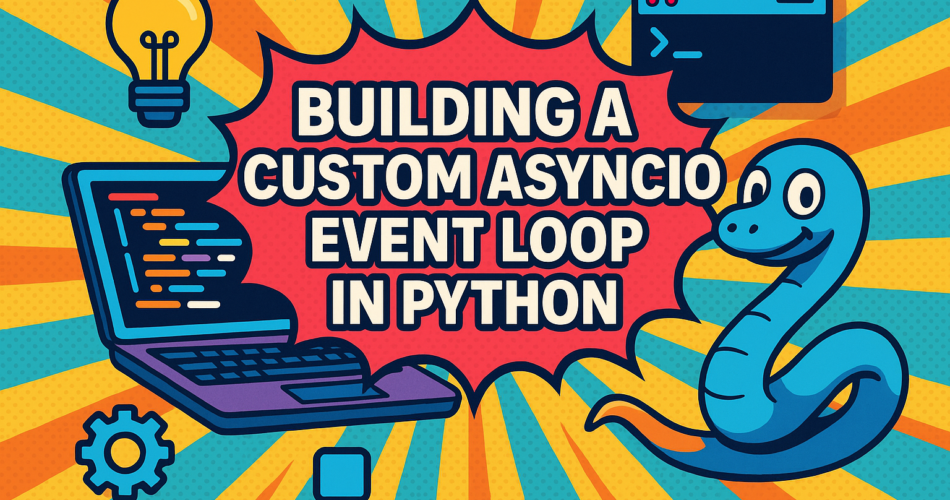A custom asyncio event loop gives you full control over task scheduling, I/O integration, and performance tuning—ideal for web servers, game engines, or hardware projects. In this guide, you’ll:
- Understand core concepts of an event loop
- Implement a minimal loop with
call_soonandcall_later - Add error handling, coroutines, and I/O hooks
- Explore advanced schedulers (priority, rate limiting)
- Package your loop as a drop‑in
asynciobackend
What Is an Event Loop?
An event loop is the heart of asyncio, repeating these steps until stopped:
- Run tasks queued for immediate execution (
call_soon). - Execute delayed tasks when their timer expires (
call_later). - Poll I/O (files, sockets) and dispatch readiness callbacks.
Keeping logic simple and non-blocking makes your application performant and scalable.
Why Build Your Own Loop?
Most developers use the built-in Python loop. A custom loop lets you:
- Optimize for specific workloads (low-latency, high-throughput)
- Integrate with non-standard I/O (game engine tick, hardware interrupts)
- Customize scheduling policies (priorities, rate limits, time slices)
Implementing a Minimal Loop
Below is a minimal MiniLoop supporting call_soon, call_later, and stop.
import time
import heapq
class MiniLoop:
def __init__(self):
self._ready = [] # immediate callbacks
self._scheduled = [] # heap of (timestamp, callback, args)
self._running = False
def run_forever(self):
self._running = True
while self._running:
now = time.time()
# Run ready callbacks
while self._ready:
cb, args = self._ready.pop(0)
try:
cb(*args)
except Exception as e:
print("Callback error:", e)
# Run delayed callbacks
while self._scheduled and self._scheduled[0][0] <= now:
_, cb, args = heapq.heappop(self._scheduled)
try:
cb(*args)
except Exception as e:
print("Scheduled error:", e)
# Sleep until next timer or briefly
if self._scheduled:
sleep_time = max(0, self._scheduled[0][0] - now)
time.sleep(sleep_time)
else:
time.sleep(0.01)
def stop(self):
self._running = False
def call_soon(self, callback, *args):
self._ready.append((callback, args))
def call_later(self, delay, callback, *args):
heapq.heappush(self._scheduled, (time.time() + delay, callback, args))
Code Explanation:
- Uses a list for immediate callbacks and a
heapqfor timers. - Catches exceptions so one failing callback won’t halt the loop.
Error Handling Best Practices
Always wrap your callback calls in try/except:
try:
cb(*args)
except Exception as e:
print("Loop callback error:", e)
This prevents any single error from stopping your entire event loop.
Adding Tasks & Coroutines
To support async/await, integrate with asyncio.Task:
import asyncio
def create_task(loop, coro):
task = asyncio.Task(coro, loop=loop)
loop.call_soon(task._step)
return task
Code Explanation:
- Wraps a coroutine in a
Task, then schedules its first step.
Timers & Priority Scheduling
Implement priorities so critical tasks run first:
import heapq
class PriorityLoop(MiniLoop):
def __init__(self):
super().__init__()
self._priority = [] # heap of (prio, callback, args)
def call_soon_priority(self, prio, callback, *args):
heapq.heappush(self._priority, (prio, callback, args))
def run_forever(self):
self._running = True
while self._running:
# High priority
while self._priority:
_, cb, args = heapq.heappop(self._priority)
cb(*args)
# Normal via parent
super().run_forever()
I/O Integration
Use selectors for efficient I/O polling:
import selectors
class IOLoop(MiniLoop):
def __init__(self):
super().__init__()
self._sel = selectors.DefaultSelector()
def add_reader(self, fd, cb, *args):
self._sel.register(fd, selectors.EVENT_READ, (cb, args))
def run_forever(self):
while self._running:
super().run_forever_iteration()
events = self._sel.select(timeout=0)
for key, _ in events:
cb, args = key.data
cb(*args)
Advanced Schedulers
- Real-Time Deadlines: schedule at exact timestamps
- Rate Limiting: throttle callback frequency
- Cooperative Slices: give each task a CPU time slice
Packaging & Publishing
Provide an EventLoopPolicy for easy adoption:
import asyncio
class CustomPolicy(asyncio.DefaultEventLoopPolicy):
def new_event_loop(self):
return FullLoop()
asyncio.set_event_loop_policy(CustomPolicy())
Next Steps & Resources
- Benchmark against
SelectorEventLoopwithtimeit - Experiment with custom I/O sources and schedulers

